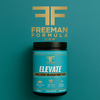What It Is
Unleaded Power is Freeman Formula’s clean, high-frequency pre-workout designed to elevate your energy, sharpen your focus, and activate your internal power source without the crash, jitters, or chemical overload found in typical pre-workout blends.
This formula combines cellular hydration, nitric oxide support, clean stimulant energy, and mind–body activation to help you perform with clarity and intention. Unleaded Power is crafted for individuals who want pure performance without synthetic shortcuts — energy that flows, not spikes.
Just like every Freeman Formula product, Unleaded Power aligns with the philosophy that thought is the origin. When your mind is activated and your cells are nourished, your body responds with power, precision, and drive.
Key Benefits
• Clean, sustained energy without jitters
• Boosts nitric oxide for pumps & circulation
• Enhances focus, clarity, and mental sharpness
• Supports endurance, stamina, and overall output
• Deep cellular hydration for better performance
• Helps reduce fatigue and improve recovery
• Zero sugar, zero crash, zero artificial fillers
• Perfect for training, sports, or long work days
Used as a pre-workout supplement to promote energy, increase focus and maintain endurance. It encourages the mind and body to respond quickly during a workout and allows more nutrition to flow through the body to your muscles. This pre-workout will not cause sleep disturbances when taken close to the end of the day. It also helps promote muscle mass development.*
| Formula Purposes & Benefits |
|
Unleaded Power (Tropical Sunrise) is synthesized to may support improved exercise performance, increase muscle protein synthesis, prevent muscle tissue breakdown, increase energy, increase cognition, enhance your pump, and take your workouts to the next level!
Our product is synthesized utilizing the latest scientific research and formulated with optimal ratios of branch chain amino acids to produce world-class results.
Our formula is third-party independently tested for heavy metals, impurities, made in the USA, GMP certified, and produced in an FDA registered facility.
|
|
Formula Ingredient Deck
|
Benefits Of Each Ingredient
|
|
Vitamin B6 pyridoxal 5'-phosphate (PLP)
|
- Serves as a cofactor in more than 150 enzymatic reactions associated in blood sugar regulation, immunity, cardiovascular function, neuronal health, metabolic, and digestive health (38, 40).
-
May support reduced plasma glucose (blood sugar levels) via inhibiting the activity of small-intestinal α-glucosidases (enzymes associated with glucose metabolism) (39).
-
Functions as an antioxidant by counteracting the formation of reactive oxygen species (inflammatory markers) and advanced glycation end-products (38,40).
- May support blood sugar regulation in women with gestational diabetes (40).
- Cofactor for enzymes involved in DNA metabolism (40).
|
|
Niacin (Vitamin B3)
|
- Major B vitamin that supports cardiovascular health by inhibiting hepatic(liver) triglyceride synthesis, reduced very-low-density lipoprotein (VLDL) secretion, and increasing HDL plasma concentrations (8,9,10,11).
- May reduce conversion of VLDL into LDL proteins and serum lipoprotein concentrations in plasma (blood) (8,9,10,11).
- Vital for regulation of gene expression, cell cycle progression, and DNA repair, and cell death (8,9,10,11).
-
May support healthy inflammatory responses via antioxidant and anti-apoptotic (prevention of cell death) properties (8,9,10,11)
-
May support cognitive health by reducing the age-related decline of NAD+, increasing quinolinic acid, and reducing neuroinflammation (8,9,10,11).
-
Increased niacin-associated NAD+ levels have been shown to support neurotransmission, learning, and memory (8,9,10,11).
- Niacin may reduce the prevalence of neurodegenerative pathologies by supporting mitochondrial dysfunction (8,9,10,11).
|
|
Caffeine Anhydrous
|
- May support optimized energy, cognitive function, and mental alertness (24).
- Supplementation with caffeine has been shown to acutely enhance exercise performance (24).
|
|
L-Citrulline Malate
|
- May support cardiovascular health and exercise performance by increasing the production of l-arginine (34).
-
May support increased nitric oxide production, improved exercise performance, and increased blood flow to exercising skeletal muscle (35).
-
May support strength increases, exercise endurance, and recovery (34,35).
- May support reduced blood pressure by increasing vascular function (34).
|
|
Vitamin B-12 (Methylcobalamin)
|
-
May support proper DNA synthesis, folate cycle function, energy production, cognitive function, and immune health (51,53).
- Aids as an antioxidant via direct scavenging of reactive oxygen species (inflammation), preserving l-glutathione levels (master antioxidant), and reducing oxidative stress (51).
- May support reduced vitamin b-12 deficiency pathologies such as anemia, neurodegenerative disease, cardiovascular disease, and osteoporosis (53).
|
|
Creatine Monohydrate
|
-
Optimizes exercise performance, muscle mass, strength, thermoregulation, recovery, and intramuscular stores of phosphocreatine (PCr) (47).
- Vital for the energy reaction of every cell in the human body as a spatial energy shuttle and energy sensor (47,50).
- Vital in bioenergetics (metabolic activity) of the brain (50).
-
Fuels CD8 and CD4 T- cell-mediated immunity (immune cells) (48,49).
-
May support cognitive health in brain creatine deficiency associated with neurodegenerative diseases (50).
-
May support cognitive health by enhancing the facilitation of synaptic glutamate and neurotransmitter uptake (50).
|
|
Vitamin B2
|
|
|
Vitamin B1
|
- May support aerobic energy metabolism (oxidative phosphorylation), cell growth, optimal neuronal conduction (nerve impulses), and cardiovascular health (94).
-
May support cardiovascular function and aids as a neuroprotective agent in individuals with vitamin B-1 deficiencies (94, 95).
|
|
Vitamin B5
|
-
May support energy production, cell growth, cell repair, cognitive function, increased hippocampal volume (memory), and optimized bioenergetics (burning of carbohydrates, fat, and protein) (96).
|
|
Vitamin C
|
-
May support immune, cardiovascular, skin, cognitive, fat burning, and digestive health (97, 98).
- May support immune health via increased oxidant, free radical scavenging, and fueling neutrophilic (immune cell) activity in chemotaxis, phagocytosis, and microbial killing (97,98).
- May support fat burning by increasing carnitine biosynthesis (molecule required for mitochondrial fatty acid oxidation) (97,98).
-
May support accelerated bone healing after a fracture, increased type I collagen synthesis, and reduced oxidative stress (inflammation) (98).
|
|
Betaine Anhydrous
|
-
May support healthy digestion, protein metabolism, and balanced stomach acid levels in aging adults (370).
-
May support reduced prevalence of obesity via improved gut microbiome activity (371).
|
|
Dynamine
|
|
|
GABA
|
-
May support positive mood, increased memory, reduced anxiety, blood sugar regulation, and increased growth hormone production (102).
|
|
Beta Alanine
|
-
May support improved exercise performance, increased nutrient delivery to exercising muscle, and reduced lactate-associated neurological exercise fatigue (15).
-
May support reduced carnosine (muscle acidity) levels and acts as an intramuscular ph buffer (15).
- May support reduced lactate “burn” associated fatigue during extreme exercise (15).
|
| Proper Use of This Supplement |
|
Suggested Use: As a dietary supplement, take one (1) scoop with 8-12 oz of water. New users may wish to assess tolerance with ½ scoop. |
| Our Formula Vs Other Formulas on the Market |
| 1. Uses third-party independently tested ingredients that are made in the USA, GMP certified, and made in an FDA registered facility. |
1. Source cheap ingredients from heavily polluted soils. Even “organic” supplements not third-party tested have been removed by FDA due to high levels of heavy metals. |
| 2. Utilizes efficacious evidence-based dosages with optimal ratios of amino acids, nootropics, and pump enhancers to support exercise performance and recovery. |
2. Use low amounts of cheap forms of amino acids, nootropics, and pump enhancers that result in poor absorption and muscle growth, recovery, and exercise performance. |
Why It Belongs in Your Ritual
Every high-performance day — whether it’s in the gym, at work, or managing life — requires intentional energy. Unleaded Power provides the clean ignition source your cells need to work at their best.
Adding this formula to your daily ritual means choosing:
• Clean energy
• Clear thought
• Strong performance
• Better cellular function
• Elevated frequency
It becomes more than a pre-workout.
It becomes your activation ritual.
Who Should Use It
Unleaded Power is ideal for:
• Men and women who want clean, effective pre-workout energy
• Athletes and gym-goers
• People who avoid harsh stimulants or synthetic formulas
• High performers needing focus + physical drive
• Individuals sensitive to crashes or jitters
• Anyone who wants energy that feels natural and aligned
Why You’ll Love It
Because it feels good.
Not wired, not anxious — just powerful.
Unleaded Power supports a smooth energy wave that lifts your mind and body into alignment. You’ll love:
• The clean focus
• The strong pumps
• The smooth endurance
• The energized state without the drop
• The bright, refreshing taste
• The feeling of being ON without being overwhelmed
This is energy with intention.
Energy with alignment.
Science-Backed Formula
Citrulline & Nitric Oxide Support
Boosts circulation, improves pumps, and enhances oxygen delivery to muscles.
Beta-Alanine
Supports muscular endurance and high-intensity performance.
Clean Natural Stimulants
Increase focus and energy without overstimulating the nervous system.
Electrolytes & Hydration Minerals
Support conductivity, muscle contraction, and sustained stamina.
Antioxidants
Neutralize free radicals from intense training and physical stress.
Unleaded Power reflects Freeman Formula’s foundation:
Support the cell, elevate the mind, activate the spirit.
What Makes Ours Different
Unleaded Power stands out because:
• It’s a clean pre-workout with no junk, fillers, or hidden chemicals
• Designed for both physical performance AND mental alignment
• Provides smooth energy instead of a harsh stimulant spike
• Hydrates while energizing
• Supports cellular function — not just superficial “hype energy”
• Rooted in the Freeman Formula principles of spirit, mind, and body integration
This is the modern pre-workout for high-frequency living.
FAQs
Q: Will this give me jitters?
No. The formula is designed for clean energy without nervous system overload.
Q: Can I use this if I’m sensitive to caffeine?
Yes. It uses clean stimulant sources designed for smooth, steady energy.
Q: When should I take Unleaded Power?
15–20 minutes before training or any activity requiring focus and stamina.
Q: Is this only for workouts?
Not at all. Many people use it for morning energy, long workdays, or creative flow.
Q: Is it safe for daily use?
Yes — when used as directed, it supports natural cellular function and performance.
Sources:
- Ueland, P. M., McCann, A., Midttun, Ø., & Ulvik, A. (2017). Inflammation, vitamin B6 and related pathways. Molecular aspects of medicine, 53, 10–27. https://doi.org/10.1016/j.mam.2016.08.001
- Bird R. P. (2018). The Emerging Role of Vitamin B6 in Inflammation and Carcinogenesis. Advances in food and nutrition research, 83, 151–194. https://doi.org/10.1016/bs.afnr.2017.11.004
- Mascolo, E., & Vernì, F. (2020). Vitamin B6 and Diabetes: Relationship and Molecular Mechanisms. International journal of molecular sciences, 21(10), 3669. https://doi.org/10.3390/ijms21103669
- Gasperi, V., Sibilano, M., Savini, I., & Catani, M. V. (2019). Niacin in the Central Nervous System: An Update of Biological Aspects and Clinical Applications. International journal of molecular sciences, 20(4), 974. https://doi.org/10.3390/ijms20040974
- Gentilcore D. (2016). Louis Sambon and the Clash of Pellagra Etiologies in Italy and the United States, 1905-14. Journal of the history of medicine and allied sciences, 71(1), 19–42. https://doi.org/10.1093/jhmas/jrv002
- Kirkland J. B. (2009). Niacin status and treatment-related leukemogenesis. Molecular cancer therapeutics, 8(4), 725–732. https://doi.org/10.1158/1535-7163.MCT-09-0042
- Hoskin, P., Rojas, A., & Saunders, M. (2009). Accelerated radiotherapy, carbogen, and nicotinamide (ARCON) in the treatment of advanced bladder cancer: mature results of a Phase II nonrandomized study. International journal of radiation oncology, biology, physics, 73(5), 1425–1431. https://doi.org/10.1016/j.ijrobp.2008.06.1950
- Guest, N. S., VanDusseldorp, T. A., Nelson, M. T., Grgic, J., Schoenfeld, B. J., Jenkins, N., Arent, S. M., Antonio, J., Stout, J. R., Trexler, E. T., Smith-Ryan, A. E., Goldstein, E. R., Kalman, D. S., & Campbell, B. I. (2021). International society of sports nutrition position stand: caffeine and exercise performance. Journal of the International Society of Sports Nutrition, 18(1), 1. https://doi.org/10.1186/s12970-020-00383-4
- van de Lagemaat, E. E., de Groot, L., & van den Heuvel, E. (2019). Vitamin B12in Relation to Oxidative Stress: A Systematic Review. Nutrients, 11(2), 482. https://doi.org/10.3390/nu11020482
- Romain, M., Sviri, S., Linton, D. M., Stav, I., & van Heerden, P. V. (2016). The role of Vitamin B12 in the critically ill--a review. Anaesthesia and intensive care, 44(4), 447–452. https://doi.org/10.1177/0310057X1604400410
- Shipton, M. J., & Thachil, J. (2015). Vitamin B12 deficiency - A 21st century perspective . Clinical medicine (London, England), 15(2), 145–150. https://doi.org/10.7861/clinmedicine.15-2-145
- Kreider, R. B., Kalman, D. S., Antonio, J., Ziegenfuss, T. N., Wildman, R., Collins, R., … Lopez, H. L. (2017). International Society of Sports Nutrition position stand: safety and efficacy of creatine supplementation in exercise, sport, and medicine. Journal of the International Society of Sports Nutrition, 14, 18. doi:10.1186/s12970-017-0173-z
- Di Biase, S., Ma, X., Wang, X., Yu, J., Wang, Y. C., Smith, D. J., Zhou, Y., Li, Z., Kim, Y. J., Clarke, N., To, A., & Yang, L. (2019). Creatine uptake regulates CD8 T cell antitumor immunity. The Journal of experimental medicine, 216(12), 2869–2882. https://doi.org/10.1084/jem.20182044
- Kazak, L., & Cohen, P. (2020). Creatine metabolism: energy homeostasis, immunity and cancer biology. Nature reviews. Endocrinology, 16(8), 421–436. https://doi.org/10.1038/s41574-020-0365-5
- Ebrahimi, K., Jourkesh, M., Sadigh-Eteghad, S., Stannard, S. R., Earnest, C. P., Ramsbottom, R., Antonio, J., & Navin, K. H. (2020). Effects of Physical Activity on Brain Energy Biomarkers in Alzheimer's Diseases. Diseases (Basel, Switzerland), 8(2), 18. https://doi.org/10.3390/diseases8020018
- Thakur, K., Tomar, S. K., Singh, A. K., Mandal, S., & Arora, S. (2017). Riboflavin and health: A review of recent human research. Critical reviews in food science and nutrition, 57(17), 3650–3660. https://doi.org/10.1080/10408398.2016.1145104
- Suwannasom, N., Kao, I., Pruß, A., Georgieva, R., & Bäumler, H. (2020). Riboflavin: The Health Benefits of a Forgotten Natural Vitamin. International journal of molecular sciences, 21(3), 950. https://doi.org/10.3390/ijms21030950
- DiNicolantonio, J. J., Niazi, A. K., Lavie, C. J., O'Keefe, J. H., & Ventura, H. O. (2013). Thiamine supplementation for the treatment of heart failure: a review of the literature. Congestive heart failure (Greenwich, Conn.), 19(4), 214–222. https://doi.org/10.1111/chf.12037
- Saedisomeolia, A., & Ashoori, M. (2018). Riboflavin in Human Health: A Review of Current Evidences. Advances in food and nutrition research, 83, 57–81. https://doi.org/10.1016/bs.afnr.2017.11.002
- Ragaller, V., Lebzien, P., Südekum, K. H., Hüther, L., & Flachowsky, G. (2011). Pantothenic acid in ruminant nutrition: a review. Journal of animal physiology and animal nutrition, 95(1), 6–16. https://doi.org/10.1111/j.1439-0396.2010.01004.x
- Carr, A. C., & Maggini, S. (2017). Vitamin C and Immune Function. Nutrients, 9(11), 1211. https://doi.org/10.3390/nu9111211
- DePhillipo, N. N., Aman, Z. S., Kennedy, M. I., Begley, J. P., Moatshe, G., & LaPrade, R. F. (2018). Efficacy of Vitamin C Supplementation on Collagen Synthesis and Oxidative Stress After Musculoskeletal Injuries: A Systematic Review. Orthopaedic journal of sports medicine, 6(10), 2325967118804544. https://doi.org/10.1177/2325967118804544
- Hoffman, J. R., Ratamess, N. A., Kang, J., Gonzalez, A. M., Beller, N. A., & Craig, S. A. (2011). Effect of 15 days of betaine ingestion on concentric and eccentric force outputs during isokinetic exercise. Journal of strength and conditioning research, 25(8), 2235–2241. https://doi.org/10.1519/JSC.0b013e3182162530
- Harty, P. S., Zabriskie, H. A., Erickson, J. L., Molling, P. E., Kerksick, C. M., & Jagim, A. R. (2018). Multi-ingredient pre-workout supplements, safety implications, and performance outcomes: a brief review. Journal of the International Society of Sports Nutrition, 15(1), 41. https://doi.org/10.1186/s12970-018-0247-6
- VanDusseldorp, T. A., Stratton, M. T., Bailly, A. R., Holmes, A. J., Alesi, M. G., Feito, Y., Mangine, G. T., Hester, G. M., Esmat, T. A., Barcala, M., Tuggle, K. R., Snyder, M., & Modjeski, A. S. (2020). Safety of Short-Term Supplementation with Methylliberine (Dynamine®) Alone and in Combination with TeaCrine® in Young Adults. Nutrients, 12(3), 654. https://doi.org/10.3390/nu12030654
- Powers M. (2012). GABA supplementation and growth hormone response. Medicine and sport science, 59, 36–46. https://doi.org/10.1159/000341944

* These statements have not been evaluated by the Food and Drug Administration. This product is not intended to diagnose, treat, cure or prevent any disease.













